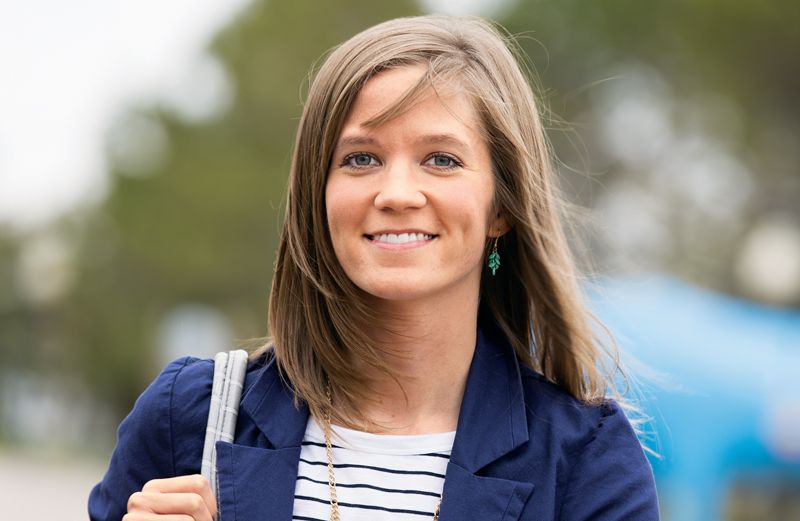He said he loved me. He said he wanted to marry me. And after dating for more than a year, I cared deeply about him too. But deep down I knew something was missing in the relationship. So I ended things.
Three months later, he’d moved on. Me? I was miserable, crying myself to sleep at night, missing him like crazy. Had I made the wrong decision? If I had given it more time, would my feelings have changed? My sadness soon gave way to anger. An anger that rose up from the depths of my soul.
This was more than a breakup between John and me. This felt like a breakup between God and me.
Growing up, my faith had been rock solid. Every Sunday back in Bemidji, Minnesota, my parents brought my five siblings and me to church. It came naturally to me to read God’s Word, pray fervently and trust his plan for my life. Completely.
I believed he had led me to Minnesota State University Moorhead—where I’d graduate in May, with my master’s in speech-language pathology. I had wanted so badly to leave my little hometown behind forever and go out into the world.
I believed God had led me to John. We met at a Frisbee club near campus and started dating shortly afterward. So why had God brought us together only to break my heart? How was this part of the plan?
There are bigger problems than a breakup, Kalika, I tried to tell myself. Still, it was the end of a chapter of my life. And the end of my confidence in God.
I went through my days on the verge of tears. It took all my energy to focus in my classes. Everything I ate made me nauseous. And all that praying that had come so naturally? Forget it!
One time I lay in bed, thinking, Hey, God! Remember how I used to pray every night? Well, watch this! I rolled over and went to sleep. Literally turned my back.
I stopped reading my Bible. I skipped church; when I did go, I’d sit resentfully, reading my bulletin instead of listening to the sermon. Friends and family said the same thing: “God is going to use this for your good. You’ll see, Kalika.”
They meant well, but hearing that only made me madder. I just wanted people to tell me it was okay to hurt. I began to take pleasure in feeling so pitiful.
By February, my classmates were job hunting, so I figured I would look for something too. At least it was a distraction from my heartache and from my battle with God.
I combed online listings. Nothing. I hoped to work in a hospital. All the jobs I came across were at rehab centers or schools. I called my mom, frustrated.
“Dad and I are praying that God will lead you to the right place,” she told me.
“Thanks. It’s really hard for me to pray right now.”
“I know,” my mom said. “But try to trust him.”
I was grateful that my parents were praying, because I just couldn’t. Every time I tried, it brought me face-to-face with the idea that I had to go on trusting God, who was letting me suffer. And I just couldn’t do that either. I felt guilty for having so little faith.
A few days later, though, I found it. The perfect job.
“Make a difference!” read the listing. “Regional hospital seeks speech-language pathologist. Great benefits, flexible hours.”
Then I saw the name of the town. Come on, Lord! Is this some kind of cruel joke? It was in Bemidji. As in Bemidji, Minnesota, the little hometown I’d avoided for 10 years. The one place I swore I’d never live again.
We’d moved there from Minneapolis when I was in sixth grade. And Bemidji—population 13,000—was no Minneapolis. I made a few friends at church, in the choir and the youth group, and I tried to tolerate small-town living.
But when my high school classmates talked about attending Bemidji State University, I would cringe inside. Where is their sense of adventure? Their independence? Are they going to stay in this Podunk town forever?
Not me! I was going to leave poky little Bemidji behind and see the great big, beautiful world.
I went to Concordia University in Seward, Nebraska. Ten long, glorious hours from Bemidji. I missed my family but I relished my freedom. Eventually I made my way to graduate school in Moorhead—not exactly a booming metropolis, but three times the size of Bemidji. I loved it. It was just right.
Now I sat, staring at the computer, the name Bemidji practically punching me in the eye. Okay. I guess I could use the interview practice, I told myself. So I applied for the job. Before I knew it, I got a call.
“You sound like you’d be a great fit for us,” said Brad, the director of rehab services. “Would you like to come for an interview?”
“Sure,” I said. It’s just for practice, I reminded myself.
Well, I’d almost forgotten how warm a small-town welcome is. At the interview, Brad and his staff were genuine and caring. And when they explained in detail what I’d be doing, my eyes grew wide.
I’d be working in the hospital’s rehab unit, assisting stroke victims and people with brain injuries, even helping some learn to communicate again. It was exactly what I felt called to do, the very work I had prayed for. I just needed to find a job like it somewhere else. Anywhere else.
Three days later, Brad called. “Kalika, the position is yours if you choose to accept it,” he said. “We’d love to have you on our team. You’re a perfect fit.”
I was speechless. Finally I stammered, “May I have a couple of days to think it over?”
“Of course,” he said. “Just let us know what you decide.”
I hung up the phone, and began sobbing uncontrollably. It had hit me that I wasn’t ready to leave Moorhead. Bemidji was a confirmation that I had failed. Failed to move away. Failed to find a man. What if there was a chance that John and I could get back together?
Two days later, I turned down the job offer. Then I told John that I missed him and that I wanted to give us another try.
“I’m sorry, Kalika,” he said. “I’m seeing someone.”
My heart broke all over again. And suddenly, the thought of moving back to Bemidji didn’t seem so bad, because there was nothing left to do. I was beaten. I longed for my family, for their love and support.
I called Brad. “Is the position still open?” I asked.
“Yes, it is, and it’s all yours if you want it.”
I did.
I went back to Bemidji in June, found three great roommates and moved into a rental house just six blocks from my parents. And the job was a dream—better than I’d hoped for. Yet I was still skittish about trusting God, still resentful that he had taken John out of my life.
I turned to the one place that had been my solace the first time I’d moved to Bemidji: my church. Little by little, I started praying more—small, timid, one-sentence prayers at first, nothing big. But it was a start. I opened my Bible too.
One day in August, my eyes fell on a verse. Romans 12:12: “Be joyful in hope, patient in affliction, faithful in prayer.” It was like God was speaking directly to me.
Be joyful in hope? I could work on that. Be patient? I didn’t really have a choice there. And pray? I could start that right now. Lord, I prayed, thank you for providing for me, even when I’ve ignored you. For loving me, even when I’ve been completely unlikable.
That’s when something unexpected happened: The more I opened my heart back up to God, the more the anger and hurt inside me melted away. I found all the comfort and solace I needed right where I was, in little Bemidji. A place I’ve grown to love more than anywhere else in the world.
Download your FREE ebook, A Prayer for Every Need, by Dr. Norman Vincent Peale






